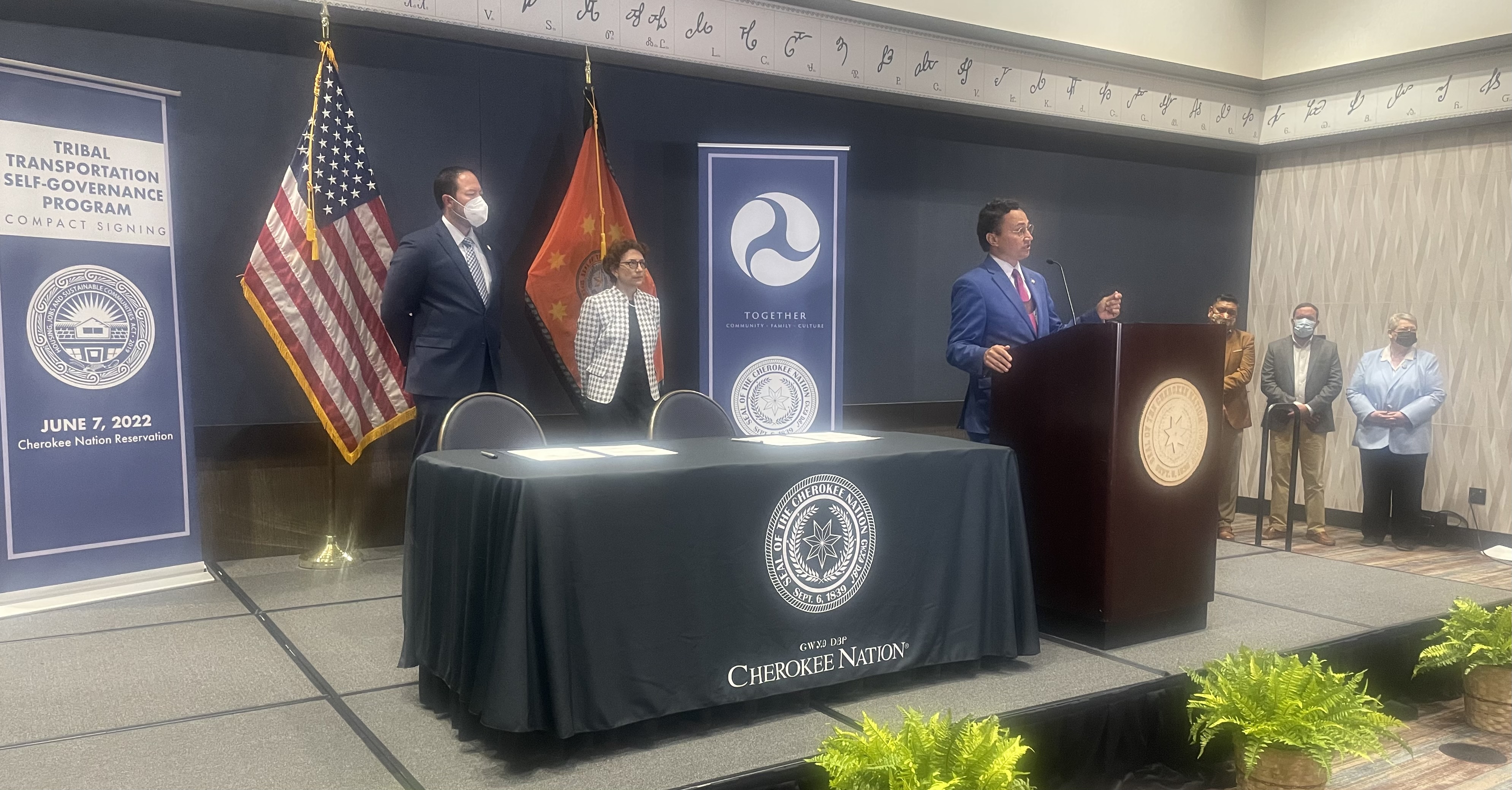
- Details
- By Chuck Hoskin Jr
Guest Opinion. It’s a high priority for Cherokee Nation that our citizens can easily get around our 7,000-square-mile reservation. Well-built and maintained transportation infrastructure improves lives, making it easier to commute to jobs, go to the doctor, buy groceries and other essentials, and visit friends and family. As a sovereign government, we have the power and responsibility to meet these transportation needs.
That power is even stronger today, thanks to a historic self-governance compact that was recently signed with the U.S. Department of Transportation. The agreement is the first of its kind between a tribe and the federal government. It enables Cherokee Nation to plan and oversee our own road construction and transit projects. With self-governance over transportation funding, we will be able to move forward on transportation projects without needing to seek permission from the federal government.
This agreement speeds up funding and gives Cherokee Nation more flexibility to plan further into the future. We know better transportation means better economic opportunity, better jobs and more small-business opportunities. We know it impacts how our children get safely to and from school.
Just as importantly, we know that rural Cherokee communities, many established before statehood, depend on these investments. These communities are home to incredibly valuable Cherokee culture, history and treasured ways of life. But they cannot survive in isolation. Ensuring safer and more abundant channels of transportation will help these communities survive and thrive for generations to come.
As we enter this new chapter of government-to-government relationships with the United States, we hope other tribal nations will follow suit. Cherokee Nation has created a blueprint for how all of Indian Country can pursue self-governance agreements. By signing this compact, we reaffirm tribes’ sovereign right to self-determination.
In the last fiscal year, Cherokee Nation invested $19.2 million and improved 88 miles of roadway across our 14-county reservation. So far this year, we have spent $10.3 million to improve 50 miles of roadway. The self-governance agreement means these investments will speed up and grow.
This mission includes expanding our use of sustainable energy sources, which reduces the carbon footprint of the Cherokee Nation. We continue to increase our use of electric vehicles, both cars and buses. Today, the tribe has two electric transit buses and new charging stations to accommodate them, which were purchased through a $1.5 million federal grant in 2018. The tribe also operates an electric school bus.
Our success during the last three years at securing intergovernmental agreements underscores something else that is very important. As Chief, I approach my dealings with the state and federal government without regard to partisan politics. My administration has worked with both parties – including the Trump and Biden administrations – on major funding and policy wins for Cherokee Nation. That only happens when Cherokee leaders put the interests of the Cherokee Nation above party politics. Cherokee leaders who do the opposite put Cherokee Nation’s interests at risk.
Our new self-governance agreement with the U.S. Department of Transportation is just the latest example of how Cherokee Nation’s sovereignty brings great benefits for everyone living within our reservation, including our non-Cherokee neighbors. We are building up northeast Oklahoma and investing in rural communities that have had few other sources of support. Cherokee Nation’s forward-thinking policies, backed by our sovereign rights and strong relationship with federal partners, ensure that the future of Cherokee Nation and northeast Oklahoma is bright.
Chuck Hoskin, Jr. is the principal chief of the Cherokee Nation.
More Stories Like This
Superhuman. Should We Be Better Than We Are?Senator Ben Nighthorse Campbell Proved Representation Matters
The Lie We Keep Telling About Wounded Knee
Another Weapon of Mass Destruction
Colorado cannot heal until it confronts Sand Creek honestly
Help us defend tribal sovereignty.
At Native News Online, our mission is rooted in telling the stories that strengthen sovereignty and uplift Indigenous voices — not just at year’s end, but every single day.
Because of your generosity last year, we were able to keep our reporters on the ground in tribal communities, at national gatherings and in the halls of Congress — covering the issues that matter most to Indian Country: sovereignty, culture, education, health and economic opportunity.
That support sustained us through a tough year in 2025. Now, as we look to the year ahead, we need your help right now to ensure warrior journalism remains strong — reporting that defends tribal sovereignty, amplifies Native truth, and holds power accountable.
 The stakes couldn't be higher. Your support keeps Native voices heard, Native stories told and Native sovereignty defended.
The stakes couldn't be higher. Your support keeps Native voices heard, Native stories told and Native sovereignty defended.
Stand with Warrior Journalism today.
Levi Rickert (Potawatomi), Editor & Publisher

